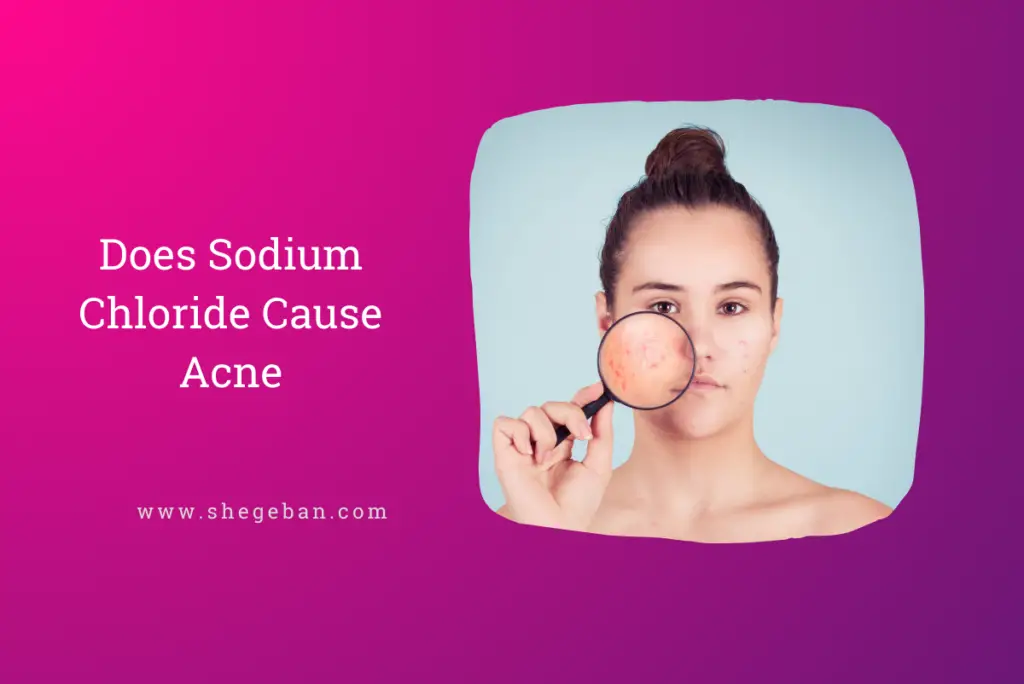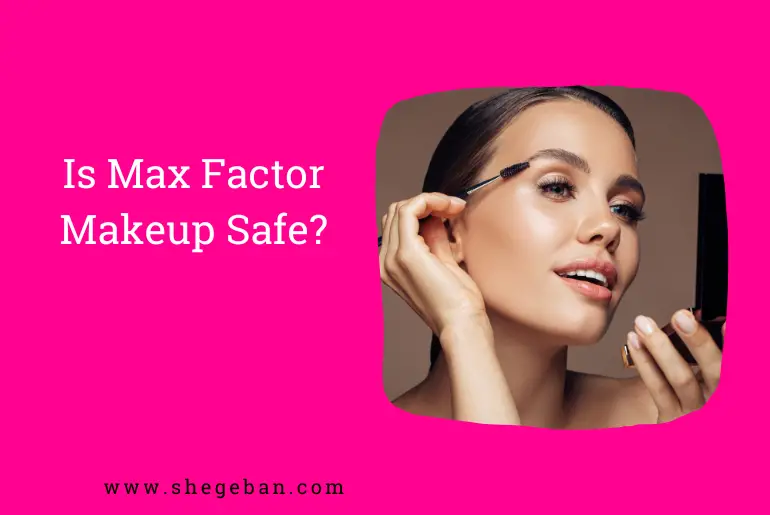Acne occurs when hair follicles become clogged with oil, dead skin cells, and bacteria, forming pimples and blackheads. Also, hormonal changes, particularly during adolescence, play a significant role in acne development.
Although quite a number of ingredients used in makeup products and food can influence skin health, there is often confusion about whether or not sodium chloride can cause acne.
Sodium chloride, also known as table salt, is not known to cause acne directly. However, there are several ways in which it may indirectly contribute to acne breakouts.
This blog post will explore the relationship between sodium chloride and acne.
What Does Sodium Chloride Do in Makeup?
1. Thickening Agent
Sodium chloride can be used as a thickener to adjust the consistency or texture of certain makeup formulations. It helps create a smooth and spreadable product.
2. Stabilizer
In some cosmetics, sodium chloride can act as a stabilizer to prevent the separation of ingredients. It helps maintain the overall integrity and homogeneity of the product.
3. Preservative
Sodium chloride has antimicrobial properties and can serve as a mild preservative in cosmetics. It helps inhibit the growth of bacteria and fungi, extending the shelf life of the product.
4. Exfoliant
Some makeup products such as facial scrubs or exfoliating cleansers, sodium chloride can be used as a gentle exfoliating agent. It helps remove dead skin cells, leaving the skin smoother and brighter.
5 Ways Sodium Chloride May Contribute To Acne Breakout
Sodium chloride, or table salt, may indirectly contribute to acne breakouts in several ways:
1. Dehydration
Consuming large amounts of sodium can lead to dehydration, which can cause the skin to produce more oil to compensate. Excess oil production can clog pores and contribute to the development of acne.
2. Iodine sensitivity
Some people may be sensitive to iodine, which is often found in table salt. Iodine can stimulate the production of sebum, the oily substance that can clog pores and lead to acne.
3. Inflammation
Consuming a diet high in processed and salty foods may lead to inflammation, which can exacerbate acne symptoms.
4. Altering the skin’s pH
Sodium chloride can alter the skin’s pH, making it more alkaline. This can disrupt the skin’s natural barrier function and make it more susceptible to acne-causing bacteria.
5. Irritation
Sodium chloride can irritate the skin, particularly if it is applied in high concentrations or left on the skin for an extended period. Irritation can lead to inflammation, which can exacerbate acne symptoms.
Alternative Ingredients You Can Use Instead of Sodium Chloride to Prevent Acne
If you’re looking for alternative ingredients to replace sodium chloride and potentially help prevent acne, there are a few options you can try
1. Salicylic Acid
Salicylic acid is a beta-hydroxyl acid (BHA) that exfoliates the skin and helps unclog pores. It is often found in acne treatments and cleansers, as it can help reduce oiliness and prevent the formation of new acne lesions.
2. Benzoyl Peroxide
Benzoyl peroxide is an antibacterial ingredient that effectively kills acne-causing bacteria. It also helps to reduce inflammation and remove excess oil from the skin. Benzoyl peroxide is commonly used in acne spot treatments and cleansers.
3. Tea Tree Oil
It is a natural ingredient with antimicrobial properties. It can help kill bacteria on the skin’s surface and reduce acne lesions. However, use tea tree oil in diluted form to avoid skin irritation.
4. Retinoid
It is derived from vitamin A. and it works by speeding up cell turnover, preventing the formation of new acne lesions, and promoting smoother skin. Retinoids can be effective but may cause dryness and sensitivity, so ensure to start with a low concentration and gradually increase usage.
5. Niacinamide
This is a form of vitamin B3. It has anti-inflammatory properties and helps regulate sebum production. It can be beneficial for acne-prone skin by reducing redness and controlling oiliness.
6. Sulfur
Sulfur is an ingredient that helps absorb excess oil and exfoliate the skin. It has antibacterial and anti-inflammatory properties, making it suitable for treating acne. Sulfur is commonly found in spot treatments and masks.
7. Green Tea Extract
Green tea extract contains antioxidants that can help calm inflammation and reduce oiliness. It also has antimicrobial properties that may be beneficial for acne-prone skin.
7 Makeup Product You Should Avoid to Prevent Acne
You have to be mindful of the makeup products you use if you are prone to acne. Certain makeup products can contribute to clogged pores and worsen acne breakouts. Below are some types of makeup products that you may consider getting rid of or using with caution:
1. Heavy, oil-based foundations
Heavy foundations and those containing oils can clog pores and contribute to the formation of acne. Opt for lightweight, non-comedogenic (non-pore-clogging) foundations or tinted moisturizers specifically formulated for acne-prone skin.
2. Thick, creamy concealers
Thick, creamy concealers can potentially clog pores and make existing acne worse. Look for lightweight, oil-free concealers that won’t further congest your skin.
3. Shimmering or glittery products
Shimmering or glittery makeup products, such as eyeshadows or highlighters, often contain mica or other particles that can potentially irritate the skin and cause breakouts. If you notice that these types of products tend to exacerbate your acne, consider avoiding or minimizing their use.
4. Certain powders
Some powders, particularly those with heavy formulations or containing irritants like talc or bismuth oxychloride, can clog pores and aggravate acne. Opt for lightweight, mineral-based powders that won’t suffocate your skin.
5. Dirty or expired makeup
Old or contaminated makeup can harbor bacteria and contribute to skin problems, including acne. Regularly clean your makeup brushes and sponges, and replace your products according to their expiration dates to maintain good hygiene.
6. Makeup products with fragrances or harsh chemicals
Fragrances and harsh chemicals can irritate the skin, leading to inflammation and breakouts. Choose fragrance-free and non-irritating makeup products labeled as suitable for sensitive skin.
7. Dirty makeup brushes and tools
Using dirty makeup brushes and tools can introduce bacteria and oil onto your skin, potentially leading to acne breakouts. To avoid this, clean your brushes regularly using a mild shampoo or brush cleaner and allow them to dry thoroughly before using them again.
Is sodium chloride in skincare comedogenic?
Sodium chloride is non-comedogenic, meaning it has a low likelihood of clogging pores and causing acne breakouts when used moderately in skincare products but excessive of it can trigger skin unhealthiness such as acne.
Is sodium chloride bad for skincare?
Sodium chloride is not bad for skincare when used in appropriate concentrations. It is a binding agent and preservative in skincare products, but prolonged exposure to high it may lead to skin dryness or irritation.
What are the dangers of sodium chloride on skin?
Sodium chloride is safe for the skin when used moderately. However, abuse of it can result in adverse effects on the skin. It may cause dryness and disrupt the skin’s natural moisture balance
Conclusion
While the impact of sodium chloride on acne is not profound when used appropriately, we advise that acne-prone skin should avoid sodium chloride sodium completely to eliminate it possible effect on their skin.
It should be a priority to pay close attention to the type of skin care products and adopt healthy lifestyle habits for overall skin safety.






